De FMS heeft verschillende onderzoeken gepubliceerd, vaak in samenwerking met andere organisaties uit het maatschappelijk middenveld. Met deze publicaties dragen we bij een diepgaand en uitgebreid onderzoek naar thema’s rondom democratiebevordering, beleidscoherentie voor (duurzame) ontwikkeling, klimaatrechtvaardigheid, migratie en de internationale sociaaldemocratie. Zie hieronder de verschillende publicaties die zijn uitgevoerd door de FMS.
Wil je ook bijdragen aan het werk van de FMS door middel van onderzoek, analyse of onze nieuwsvoorziening? Zie hier meer!
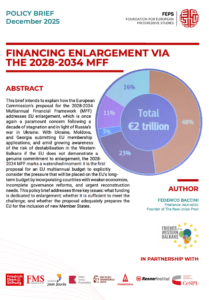 Deze beleidsnota licht toe hoe het voorstel van de Europese Commissie voor het Meerjarig Financieel Kader (MFK) 2028-2034 inspeelt op EU-uitbreiding, een onderwerp dat opnieuw hoog op de agenda staat na een decennium van stagnatie en in het licht van de volwaardige Russische invasie van Oekraïne.
Deze beleidsnota licht toe hoe het voorstel van de Europese Commissie voor het Meerjarig Financieel Kader (MFK) 2028-2034 inspeelt op EU-uitbreiding, een onderwerp dat opnieuw hoog op de agenda staat na een decennium van stagnatie en in het licht van de volwaardige Russische invasie van Oekraïne.
Met de EU-lidmaatschapsaanvragen van Oekraïne, Moldavië en Georgië, en het groeiende besef dat de stabiliteit van de Westelijke Balkan in gevaar kan komen als de EU haar oprechte betrokkenheid bij uitbreiding niet laat zien, markeert het MFK 2028-2034 een belangrijk keerpunt. Voor het eerst houdt een voorstel voor een Europees meerjarig budget expliciet rekening met de druk die de opname van landen met zwakkere economieën, onafgewerkte governance-revormen en dringende wederopbouwbehoeften zal uitoefenen op de langetermijnbegroting van de EU.
 The 2024-2025 Serbian student protests – triggered by the fatal collapse of the Novi Sad train station canopy – have become the most formidable civic challenge to Serbia’s authoritarian trajectory.
The 2024-2025 Serbian student protests – triggered by the fatal collapse of the Novi Sad train station canopy – have become the most formidable civic challenge to Serbia’s authoritarian trajectory.
This policy brief traces their evolution, from spontaneous gatherings and student blockades demanding accountability to the shift toward political engagement.
As the crisis is nowhere near its end, this paper concludes with policy recommendations for a more proactive EU response, arguing that the protests may signal a turning point in Serbia’s democratic development and reshape its European future.

In opdracht van de Nederlandse Democratie Coalitie – waar de FMS onderdeel van is – onderzochten studenten Politicologie van de Vrije Universiteit Amsterdam de situatie van sociale grondrechten in Nederland. Hoe kunnen deze grondrechten in rol spelen in de versterking van de Nederlandse democratie? Wat zijn de (on)mogelijkheden?
 Vrouwen spelen een essentiële rol in oorlogstijd, waar zij niet alleen aanzienlijke persoonlijke lasten dragen, maar ook bijdragen aan de veerkracht en het herstel van de samenleving. In Oekraïne worden moeders in armoede, en vooral alleenstaande moeders en gezinnen met kinderen, geconfronteerd met verergerde uitdagingen door de oorlog. Voor de Russische invasie in 2022 waren zij al getroffen door armoede en beperkte overheidssteun, en de oorlog heeft deze situatie verder verslechterd, vooral voor interne ontheemden. Vrouwen worden bovendien geconfronteerd met onevenredige zorgverantwoordelijkheden en worstelen onder de druk van stigmatisering en onvoldoende middelen. Deze beleidsnotitie onderzoekt de economische, sociale en emotionele strijd van deze moeders en benadrukt de noodzaak van inclusieve beleidsmaatregelen die hen ondersteunen in het herstelproces van Oekraïne.
Vrouwen spelen een essentiële rol in oorlogstijd, waar zij niet alleen aanzienlijke persoonlijke lasten dragen, maar ook bijdragen aan de veerkracht en het herstel van de samenleving. In Oekraïne worden moeders in armoede, en vooral alleenstaande moeders en gezinnen met kinderen, geconfronteerd met verergerde uitdagingen door de oorlog. Voor de Russische invasie in 2022 waren zij al getroffen door armoede en beperkte overheidssteun, en de oorlog heeft deze situatie verder verslechterd, vooral voor interne ontheemden. Vrouwen worden bovendien geconfronteerd met onevenredige zorgverantwoordelijkheden en worstelen onder de druk van stigmatisering en onvoldoende middelen. Deze beleidsnotitie onderzoekt de economische, sociale en emotionele strijd van deze moeders en benadrukt de noodzaak van inclusieve beleidsmaatregelen die hen ondersteunen in het herstelproces van Oekraïne.
 Onderwijs is een essentieel recht volgens de Oekraïense grondwet en speelt een cruciale rol in de ontwikkeling van de samenleving. In 2017 introduceerde Oekraïne de hervorming Nieuwe Oekraïense School (NUS) om het onderwijssysteem te moderniseren, met nadruk op leerlinggerichte benaderingen en een up-to-date curriculum. Door de voortdurende oorlog staan echter veel onderwijssystemen onder druk, vooral in bezette gebieden, waar het Russische onderwijsbeleid de Oekraïense identiteit probeert te ondermijnen. Dit beleidsstuk benadrukt het belang van onderwijs, zowel voor het vervullen van de directe behoeften tijdens de oorlog als voor het leggen van de basis voor de toekomst van Oekraïne, inclusief de postoorlogse wederopbouw en modernisering van het onderwijssysteem.
Onderwijs is een essentieel recht volgens de Oekraïense grondwet en speelt een cruciale rol in de ontwikkeling van de samenleving. In 2017 introduceerde Oekraïne de hervorming Nieuwe Oekraïense School (NUS) om het onderwijssysteem te moderniseren, met nadruk op leerlinggerichte benaderingen en een up-to-date curriculum. Door de voortdurende oorlog staan echter veel onderwijssystemen onder druk, vooral in bezette gebieden, waar het Russische onderwijsbeleid de Oekraïense identiteit probeert te ondermijnen. Dit beleidsstuk benadrukt het belang van onderwijs, zowel voor het vervullen van de directe behoeften tijdens de oorlog als voor het leggen van de basis voor de toekomst van Oekraïne, inclusief de postoorlogse wederopbouw en modernisering van het onderwijssysteem.
 De Russische invasie in Oekraïne heeft de gezondheidszorg in het land zwaar getroffen, waarbij al bestaande problemen zoals onder financiering, capaciteitstekorten en personeelstekorten verder zijn verergerd. In dit beleidsstuk wordt de noodzaak benadrukt voor gerichte hervormingen en een strategische allocatie van middelen om de veerkracht en toegankelijkheid van het zorgsysteem te verbeteren. De wederopbouw van het Oekraïense zorgsysteem vereist een integrale aanpak die niet alleen aandacht geeft aan korte termijn behoeften, maar ook duurzame, lange termijn oplossingen biedt. Het stuk onderzoekt de uitdagingen van deze hervormingen, met specifieke aandacht voor de rol van internationale donoren, maatschappelijke organisaties en vakbonden, en biedt aanbevelingen voor een succesvolle en veerkrachtige heropbouw van de zorginfrastructuur in Oekraïne.
De Russische invasie in Oekraïne heeft de gezondheidszorg in het land zwaar getroffen, waarbij al bestaande problemen zoals onder financiering, capaciteitstekorten en personeelstekorten verder zijn verergerd. In dit beleidsstuk wordt de noodzaak benadrukt voor gerichte hervormingen en een strategische allocatie van middelen om de veerkracht en toegankelijkheid van het zorgsysteem te verbeteren. De wederopbouw van het Oekraïense zorgsysteem vereist een integrale aanpak die niet alleen aandacht geeft aan korte termijn behoeften, maar ook duurzame, lange termijn oplossingen biedt. Het stuk onderzoekt de uitdagingen van deze hervormingen, met specifieke aandacht voor de rol van internationale donoren, maatschappelijke organisaties en vakbonden, en biedt aanbevelingen voor een succesvolle en veerkrachtige heropbouw van de zorginfrastructuur in Oekraïne.
 In Oekraïne ontbreekt het aan vooruitgang bij het implementeren van sociale dialoogmechanismen, die essentieel zijn voor het Europese sociaal model. De werking van het tripartiete orgaan, waarin vakbonden, werkgeversorganisaties en de overheid samenwerken, is in de praktijk niet effectief. De betrokkenheid van sociale partners bij de hervorming van het arbeidsrecht is onvoldoende, wat zorgen baart voor de toekomst van de sociale dialoog in Oekraïne. Er is dringende politieke druk nodig, zowel vanuit de Europese Commissie als van lidstaten, om vakbonden en werkgeversorganisaties beter te betrekken bij de herziening van het arbeidsrecht. Dit is cruciaal voor de wederopbouw van Oekraïne en voor het waarborgen van arbeidsrechten volgens Europese en internationale normen.
In Oekraïne ontbreekt het aan vooruitgang bij het implementeren van sociale dialoogmechanismen, die essentieel zijn voor het Europese sociaal model. De werking van het tripartiete orgaan, waarin vakbonden, werkgeversorganisaties en de overheid samenwerken, is in de praktijk niet effectief. De betrokkenheid van sociale partners bij de hervorming van het arbeidsrecht is onvoldoende, wat zorgen baart voor de toekomst van de sociale dialoog in Oekraïne. Er is dringende politieke druk nodig, zowel vanuit de Europese Commissie als van lidstaten, om vakbonden en werkgeversorganisaties beter te betrekken bij de herziening van het arbeidsrecht. Dit is cruciaal voor de wederopbouw van Oekraïne en voor het waarborgen van arbeidsrechten volgens Europese en internationale normen.
 De Russische invasie van Oekraïne in 2022 heeft de al bestaande problemen in de Oekraïense woningsector verergerd en nieuwe ongelijkheden gecreëerd. De oorlog heeft geleid tot aanzienlijke schade aan de woningvoorraad, vooral in het oosten van het land, en heeft een enorme toename van het aantal intern ontheemden veroorzaakt. De huidige woningwetgeving blijkt niet in staat om snel en effectief in te spelen op de dringende behoeften van de getroffen bevolking. Deze beleidsnotitie benadrukt de urgentie van een fundamentele verandering in het huisvestingsbeleid, met voorstellen voor het opzetten van een Nationale Woningagentschap, hervormingen in de woningfinanciering en herzieningen van de wetgeving om een duurzamer en rechtvaardiger woningaanbod te creëren voor de Oekraïense bevolking, met name voor economisch kwetsbare groepen.
De Russische invasie van Oekraïne in 2022 heeft de al bestaande problemen in de Oekraïense woningsector verergerd en nieuwe ongelijkheden gecreëerd. De oorlog heeft geleid tot aanzienlijke schade aan de woningvoorraad, vooral in het oosten van het land, en heeft een enorme toename van het aantal intern ontheemden veroorzaakt. De huidige woningwetgeving blijkt niet in staat om snel en effectief in te spelen op de dringende behoeften van de getroffen bevolking. Deze beleidsnotitie benadrukt de urgentie van een fundamentele verandering in het huisvestingsbeleid, met voorstellen voor het opzetten van een Nationale Woningagentschap, hervormingen in de woningfinanciering en herzieningen van de wetgeving om een duurzamer en rechtvaardiger woningaanbod te creëren voor de Oekraïense bevolking, met name voor economisch kwetsbare groepen.
In 2022 presenteerde de Oekraïense regering haar eerste visie voor de wederopbouw na de oorlog, die verder verfijnd werd tijdens de Recovery Conferences in Londen en Berlijn in 2023 en 2024. Deze beleidsstudie analyseert het opkomende welzijnsmodel in Oekraïne en benadrukt de kans om de economie en arbeidswetgeving te transformeren in het kader van de post-oorlogse wederopbouw. Door herstelplannen, recent aangenomen wetgeving en uitspraken van overheidsfunctionarissen te onderzoeken, beoordeelt de studie de ontwikkelingen in het sociale beleid en probeert het een breder publiek debat op gang te brengen over de toekomst van het sociale beleid in Oekraïne. De studie benadrukt het belang van aandacht voor sociaal beleid en biedt belangrijke aanbevelingen voor een rechtvaardiger en duurzamer herstel.
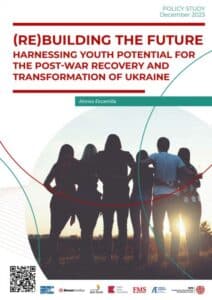
De grootschalige invasie van de Russische Federatie in Oekraïne in februari 2022 heeft een catastrofaal effect gehad op de Oekraïense jeugd. Als gevolg hiervan komen jonge Oekraïners naar voren als een belangrijke doelgroep voor overheidsbeleid zodra het naoorlogse herstelproces begint. Deze beleidsstudie benadrukt hoe belangrijk het is om jongeren positief te zien als actieve belanghebbenden die zelf betrokken moeten worden bij het herstel en de transformatie van Oekraïne.
In deze analyse benadrukt Alonso Escamilla het belang van het erkennen van Oekraïense jongeren als actieve belanghebbenden bij de transformatie en het naoorlogse herstel van hun land. De studie biedt waardevolle inzichten uit succesvolle naoorlogse herstelpraktijken en dringt er tegelijkertijd bij relevante belanghebbenden op aan om deze maatregelen af te stemmen op hun specifieke profielen, regio’s en situaties.
Escamilla vestigt de aandacht op het belang van sociaal en psychologisch welzijn, beroepsonderwijs en sociale zekerheid en presenteert een holistisch kader voor succesvolle re-integratie van jongeren. De geschetste aanpak pleit voor datagestuurde beleidsvorming, het geven van prioriteit aan inclusiviteit en het stimuleren van gemeenschapsgerichte herstelinspanningen.
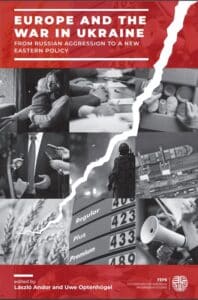 De Russische agressie tegen Oekraïne in februari 2022 schokte de wereld en bracht grote verwoesting en trauma met zich mee. De oorlog zet zich in 2023 voort, gekenmerkt door een weerbarstig Oekraïne, dat moedig en voortvarend strijdt voor haar soevereiniteit, rechtsstaat en zelfbeschikking. Westerse krachten, met de Europese Unie voorop, spelen een belangrijke rol in militaire, financiële en humanitaire steun voor Oekraïne. Op de korte termijn helpt deze steun Oekraïne in de strijd tegen de Russische agressie – op de lange termijn beoogt deze steun internationale samenwerking, vrede, en een mogelijke toetreding van Oekraïne tot de Europese Unie en de NAVO. Maar wat zijn de grote vraagstukken op de lange termijn voor Oekraïne’s democratische en economische hervormingen op weg naar de EU? Hoe kunnen progressieve krachten in Oekraïne en internationaal gebundeld worden voor een sociale en eerlijke wederopbouw in de komende jaren?
De Russische agressie tegen Oekraïne in februari 2022 schokte de wereld en bracht grote verwoesting en trauma met zich mee. De oorlog zet zich in 2023 voort, gekenmerkt door een weerbarstig Oekraïne, dat moedig en voortvarend strijdt voor haar soevereiniteit, rechtsstaat en zelfbeschikking. Westerse krachten, met de Europese Unie voorop, spelen een belangrijke rol in militaire, financiële en humanitaire steun voor Oekraïne. Op de korte termijn helpt deze steun Oekraïne in de strijd tegen de Russische agressie – op de lange termijn beoogt deze steun internationale samenwerking, vrede, en een mogelijke toetreding van Oekraïne tot de Europese Unie en de NAVO. Maar wat zijn de grote vraagstukken op de lange termijn voor Oekraïne’s democratische en economische hervormingen op weg naar de EU? Hoe kunnen progressieve krachten in Oekraïne en internationaal gebundeld worden voor een sociale en eerlijke wederopbouw in de komende jaren?
In samenwerking met een aantal internationale sociaaldemocratische stichtingen waaronder de FMS, publiceerde de Foundation for European Progressive Studies daarom het boek “Europe and the War in Ukraine, from Russian Aggression to a New Eastern Policy”. Hierin worden bovenstaande vragen bediscussieerd, met het oog op belangrijke vraagstukken rondom de agressieoorlog tegen Oekraïne vanuit een sociaaldemocratisch en progressief perspectief.
Lees hier de preview. Koop het volledige boek hier.
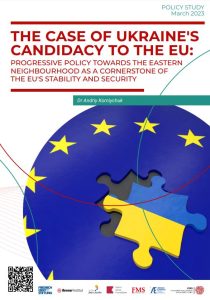 In samenwerking met de FMS, Amicus Europae, FJJ, Karl-Renner-Institut, FES Ukraine, en de Kalevi Sorsa Foundation, heeft de Europese sociaaldemocratische denktank Foundation of European Progressive Studies (FEPS) een beleidsstudie uitgevoerd naar het EU-kandidaatlidmaatschap van Oekraïne. Hieruit komt voort dat sociaal, progressief beleid cruciaal is voor de ontwikkeling van Oekraïne tot een mogelijk EU-lidmaatschap. De EU zal zelf een nieuwe visie op het uitbreidingsbeleid moeten uiteenzetten om tegemoet te komen aan de ambities van Oekraïne en de veranderende behoeften van zijn oostelijke buren. De studie bevat een aantal aanbevelingen met het oog op de toekomstige relaties van de EU met Oekraïne.
In samenwerking met de FMS, Amicus Europae, FJJ, Karl-Renner-Institut, FES Ukraine, en de Kalevi Sorsa Foundation, heeft de Europese sociaaldemocratische denktank Foundation of European Progressive Studies (FEPS) een beleidsstudie uitgevoerd naar het EU-kandidaatlidmaatschap van Oekraïne. Hieruit komt voort dat sociaal, progressief beleid cruciaal is voor de ontwikkeling van Oekraïne tot een mogelijk EU-lidmaatschap. De EU zal zelf een nieuwe visie op het uitbreidingsbeleid moeten uiteenzetten om tegemoet te komen aan de ambities van Oekraïne en de veranderende behoeften van zijn oostelijke buren. De studie bevat een aantal aanbevelingen met het oog op de toekomstige relaties van de EU met Oekraïne.
 Climate change is perhaps the biggest challenge we face in the world today. People everywhere are struggling with its devastating effects, and Africa is one of the hardest hit regions. And yet, the most important decisions regarding climate action are often made by those who do not feel the biggest impact of the climate crisis and who generally have better capabilities to deal with the problems at hand. Especially for African countries, this makes the road to a climate-just transition long and winding.
Climate change is perhaps the biggest challenge we face in the world today. People everywhere are struggling with its devastating effects, and Africa is one of the hardest hit regions. And yet, the most important decisions regarding climate action are often made by those who do not feel the biggest impact of the climate crisis and who generally have better capabilities to deal with the problems at hand. Especially for African countries, this makes the road to a climate-just transition long and winding.
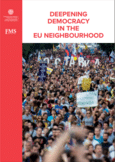 In the framework of our Deepening Democracy in EU Neighbourhood project, we organized training seminars in 9 countries over the course of 2018 and 2019: Tunisia, Morocco and Lebanon in the MENA region, Serbia, Montenegro and Bosnia Herzegovina in SEE region and Armenia, Belarus and Ukraine in Eastern Europe and Southern Caucasus. The trainings were tailor-made for each country, but in general focussed on the key topics of inclusive politics, youth participation and human rights. The present publication summarises the outcomes of those trainings, with contributions on those subject by our local partners in each country
In the framework of our Deepening Democracy in EU Neighbourhood project, we organized training seminars in 9 countries over the course of 2018 and 2019: Tunisia, Morocco and Lebanon in the MENA region, Serbia, Montenegro and Bosnia Herzegovina in SEE region and Armenia, Belarus and Ukraine in Eastern Europe and Southern Caucasus. The trainings were tailor-made for each country, but in general focussed on the key topics of inclusive politics, youth participation and human rights. The present publication summarises the outcomes of those trainings, with contributions on those subject by our local partners in each country
 In the aftermath of the large increase of, mainly, Syrian refugees into Europe in the summer of 2015, migration became one of the key topics in European Union politics. Irregular migration became intertwined with the issue of refugees, and the EU started to focus on tackling the root causes of migration. This study focuses on these responses. Are they effective and sufficient, and if not, what can be done to improve EU migration policies? It is crucial to include African perspectives in this debate. African stakeholders know what is happening on the ground and what is necessary to implement effective policies or improve failing ones. This study contributes to the discussion with several progressive policy recommendations that do include these African perspectives. Only with fair policies can Europe be an equal partner to Africa.
In the aftermath of the large increase of, mainly, Syrian refugees into Europe in the summer of 2015, migration became one of the key topics in European Union politics. Irregular migration became intertwined with the issue of refugees, and the EU started to focus on tackling the root causes of migration. This study focuses on these responses. Are they effective and sufficient, and if not, what can be done to improve EU migration policies? It is crucial to include African perspectives in this debate. African stakeholders know what is happening on the ground and what is necessary to implement effective policies or improve failing ones. This study contributes to the discussion with several progressive policy recommendations that do include these African perspectives. Only with fair policies can Europe be an equal partner to Africa.
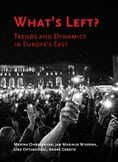 Much has happened in the Eastern Partnership countries in the past 5-10 years. An analysis of their democratic (and social democratic) development that we had made over the course of several visits in 2011 and 2012 has thus become outdated. We thus decided to revisit five Eastern Partnership countries to take a closer look at those development, and propose a much-needed re-evaluated approach to the region for the EU and European social democrats.
Much has happened in the Eastern Partnership countries in the past 5-10 years. An analysis of their democratic (and social democratic) development that we had made over the course of several visits in 2011 and 2012 has thus become outdated. We thus decided to revisit five Eastern Partnership countries to take a closer look at those development, and propose a much-needed re-evaluated approach to the region for the EU and European social democrats.
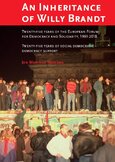 This year’s celebration of 25 years of the European Forum for Democracy and Solidarity (EFDS) was the motive to produce a short history of the organization written by Jan Marinus Wiersma, former Vice President of the PES (1990-2004) and later of the S&D Group. The European Forum was founded by the Socialist International (SI) in 1993 at the instigation of its former president, Will Brandt. Its main task would be to help identify and further develop social democratic parties and movements (potential future members of the SI) in Central and Eastern Europe, the Western Balkans and the countries formerly belonging to the Soviet Union after the collapse of communism. In the publication the most relevant activities of Forum are described and the publication mostly deals with the regions mentioned above. The role of PES, S&D group, FEPS and political foundations are highlighted in different chapters.
This year’s celebration of 25 years of the European Forum for Democracy and Solidarity (EFDS) was the motive to produce a short history of the organization written by Jan Marinus Wiersma, former Vice President of the PES (1990-2004) and later of the S&D Group. The European Forum was founded by the Socialist International (SI) in 1993 at the instigation of its former president, Will Brandt. Its main task would be to help identify and further develop social democratic parties and movements (potential future members of the SI) in Central and Eastern Europe, the Western Balkans and the countries formerly belonging to the Soviet Union after the collapse of communism. In the publication the most relevant activities of Forum are described and the publication mostly deals with the regions mentioned above. The role of PES, S&D group, FEPS and political foundations are highlighted in different chapters.
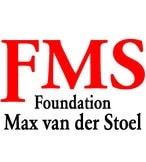 Wij hebben een aantal uitgangspunten opgesteld waar een eerlijk migratiebeleid aan moet voldoen:
Wij hebben een aantal uitgangspunten opgesteld waar een eerlijk migratiebeleid aan moet voldoen:
1) Asielzoekers hebben recht op een eerlijke procedure
2) Geen opvang van asielzoekers en migranten in kampen beheerd door landen met een slechte reputatie op het gebied van mensenrechten
3) Introduceer meer vormen van legale en gereguleerde migratie
4) Stop met het simplificeren van Afrika
5) Maak werk van een eerlijke relatie ten aanzien van de landen in Afrika
 Op een diner ten huize van Hugo’s neef en Staatsraad Paul Koppen, waarbij ook Willem Hendrik de Beaufort en Hugo Röling aanzaten, werd het plan opgevat om, naar aanleiding van het verschijnen van het boek, aan de afwijkende opinies van Bert Röling en zijn invloed op de ontwikkelingen in het internationaal recht aandacht te geven middels een symposium. Voor Paul Koppen was het al snel duidelijk dat het zou moeten gaan over de actualiteit van ‘Tokio’, de crimes against peace en de vorderingen die er sindsdien gemaakt zijn op volken rechtelijk gebied. Maar ook over de betekenisvolle rol die Bert Röling in ‘Tokio’ gespeeld heeft en de boeiende verhalen daarover van Hugo Röling in zijn boek. Kort daarna werd Paul Koppen ernstig ziek en overleed hij op 7 juli 2015. Inmiddels had hij mij gevraagd het stokje over te nemen om samen met de anderen het symposium verder vorm te geven. In samenwerking met Willem Hendrik de Beaufort is een initiatiefgroep gevormd bestaande uit Michiel Scheltema, Nico Schrijver, Arjen Berkvens (Foundation Max van der Stoel), Hugo Röling en mijzelf. Uiteindelijk heeft het symposium op 1 april 2016 plaatsgevonden in de Gotische Zaal van de Raad van State. Vooraanstaande sprekers uit kringen van het internationaal strafen publiekrecht en rechters hebben een bijdrage geleverd met inleidingen en inbreng in een paneldiscussie.1 In dit boekje treft u een neerslag daarvan aan.
Op een diner ten huize van Hugo’s neef en Staatsraad Paul Koppen, waarbij ook Willem Hendrik de Beaufort en Hugo Röling aanzaten, werd het plan opgevat om, naar aanleiding van het verschijnen van het boek, aan de afwijkende opinies van Bert Röling en zijn invloed op de ontwikkelingen in het internationaal recht aandacht te geven middels een symposium. Voor Paul Koppen was het al snel duidelijk dat het zou moeten gaan over de actualiteit van ‘Tokio’, de crimes against peace en de vorderingen die er sindsdien gemaakt zijn op volken rechtelijk gebied. Maar ook over de betekenisvolle rol die Bert Röling in ‘Tokio’ gespeeld heeft en de boeiende verhalen daarover van Hugo Röling in zijn boek. Kort daarna werd Paul Koppen ernstig ziek en overleed hij op 7 juli 2015. Inmiddels had hij mij gevraagd het stokje over te nemen om samen met de anderen het symposium verder vorm te geven. In samenwerking met Willem Hendrik de Beaufort is een initiatiefgroep gevormd bestaande uit Michiel Scheltema, Nico Schrijver, Arjen Berkvens (Foundation Max van der Stoel), Hugo Röling en mijzelf. Uiteindelijk heeft het symposium op 1 april 2016 plaatsgevonden in de Gotische Zaal van de Raad van State. Vooraanstaande sprekers uit kringen van het internationaal strafen publiekrecht en rechters hebben een bijdrage geleverd met inleidingen en inbreng in een paneldiscussie.1 In dit boekje treft u een neerslag daarvan aan.
 This publication gathered experts from Western Balkans and the EU aiming to: 1) analyse the transformation of the SEE region in recent years: Is there a setback when it comes to rule of law and fundamental rights? Has the prospect of EU membership led to sustainable progress? Which variables contribute to the fact that some countries perform better than others? 2) analyse the state of social democracy and of the social democratic parties: What is the state of social democracy in the region? What has been the role of social democratic parties in reforming and modernising their countries? How did these parties develop over the years (also with regard to internal party democracy and party fragmentation)? How do they function? Are they an engine for societal change and sustainable development? Are they a credible alternative to nationalist and populist forces? 3) analyse the role of external actors in the SEE region: What has been the role of the EU? Does it lack a comprehensive strategy towards the region with regard to democracy and the rule of law? What has been the role of European social democrats and political foundations?
This publication gathered experts from Western Balkans and the EU aiming to: 1) analyse the transformation of the SEE region in recent years: Is there a setback when it comes to rule of law and fundamental rights? Has the prospect of EU membership led to sustainable progress? Which variables contribute to the fact that some countries perform better than others? 2) analyse the state of social democracy and of the social democratic parties: What is the state of social democracy in the region? What has been the role of social democratic parties in reforming and modernising their countries? How did these parties develop over the years (also with regard to internal party democracy and party fragmentation)? How do they function? Are they an engine for societal change and sustainable development? Are they a credible alternative to nationalist and populist forces? 3) analyse the role of external actors in the SEE region: What has been the role of the EU? Does it lack a comprehensive strategy towards the region with regard to democracy and the rule of law? What has been the role of European social democrats and political foundations?
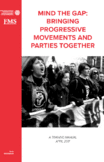 Social democratic political parties in Europe are increasingly challenged in their role as actors and engines of economic and societal change. Globalisation, the rise of populism and nationalism, the increasing influence of multinationals and financial markets on the decision-making process and political fragmentation have all contributed to an image of mainstream political parties as rigid, old and unable to effectively relate to or represent the voices and interests of citizens. The goal of this manual is to offer social democratic parties and party members tools to discuss different challenges within their parties and to (re)connect with social movements. The overall objective is to bridge the gap between citizens and political parties, so that social democratic parties can work with citizens to improve the world we live in. We used the examples and input that was given by more than 300 participants from 14 countries in the series of seminars and trainings in 2016-2017. This manual is a result of yet another successful multi-annual cooperation between Foundation for European Progressive Studies (FEPS), the progressive European think tank and the FMS. The author is Anne Graumans et al.
Social democratic political parties in Europe are increasingly challenged in their role as actors and engines of economic and societal change. Globalisation, the rise of populism and nationalism, the increasing influence of multinationals and financial markets on the decision-making process and political fragmentation have all contributed to an image of mainstream political parties as rigid, old and unable to effectively relate to or represent the voices and interests of citizens. The goal of this manual is to offer social democratic parties and party members tools to discuss different challenges within their parties and to (re)connect with social movements. The overall objective is to bridge the gap between citizens and political parties, so that social democratic parties can work with citizens to improve the world we live in. We used the examples and input that was given by more than 300 participants from 14 countries in the series of seminars and trainings in 2016-2017. This manual is a result of yet another successful multi-annual cooperation between Foundation for European Progressive Studies (FEPS), the progressive European think tank and the FMS. The author is Anne Graumans et al.
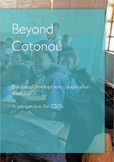 De ontwikkelingsrelatie tussen de EU en Afrika is grotendeels gebaseerd op het Cotonou-verdrag, dat in 2000 is afgesloten. In 2020 loopt dit verdrag af. Wat gaat er gebeuren na Cotonou? Waar liggen de kansen en hoe kan de Nederlandse ontwikkelingssector een bijdrage leveren aan een sterk nieuw verdrag? Dat staat centraal in de ‘Ready for Change’ publicatie ‘Beyond Cotonou: European development cooperation after 2020. A perspective for CSOs ’. ’Beyond Cotonou’, geschreven door Kaleidos Research in opdracht van ‘Ready for Change’, het maatschappelijk initiatief van Partos, FMS en Woord en Daad.
De ontwikkelingsrelatie tussen de EU en Afrika is grotendeels gebaseerd op het Cotonou-verdrag, dat in 2000 is afgesloten. In 2020 loopt dit verdrag af. Wat gaat er gebeuren na Cotonou? Waar liggen de kansen en hoe kan de Nederlandse ontwikkelingssector een bijdrage leveren aan een sterk nieuw verdrag? Dat staat centraal in de ‘Ready for Change’ publicatie ‘Beyond Cotonou: European development cooperation after 2020. A perspective for CSOs ’. ’Beyond Cotonou’, geschreven door Kaleidos Research in opdracht van ‘Ready for Change’, het maatschappelijk initiatief van Partos, FMS en Woord en Daad.
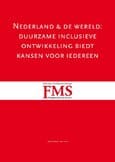 Op 23 juni presenteerde de FMS haar visie op internationale samenwerking. In de notitie “Nederland en de Wereld: duurzame inclusieve ontwikkeling biedt kansen voor iedereen” geven we antwoorden op de drie grootste uitdagingen van deze tijd, namelijk de groeiende ongelijkheid, de bedreiging van een leefbare toekomst op onze planeet door uitputting en klimaatverandering en het tekortschieten van onze internationale rechtsorde wat betreft het garanderen van vrede en veiligheid.
Op 23 juni presenteerde de FMS haar visie op internationale samenwerking. In de notitie “Nederland en de Wereld: duurzame inclusieve ontwikkeling biedt kansen voor iedereen” geven we antwoorden op de drie grootste uitdagingen van deze tijd, namelijk de groeiende ongelijkheid, de bedreiging van een leefbare toekomst op onze planeet door uitputting en klimaatverandering en het tekortschieten van onze internationale rechtsorde wat betreft het garanderen van vrede en veiligheid.
Deze notitie kwam tot stand met behulp van Paul Engel, Arjen Berkvens, Jolein Baidenmann, Peter Heintze en Wouter Kolk.
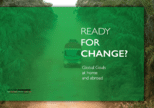 Op donderdag 19 mei ontving Christiaan Rebergen, Directeur Generaal Internationale Samenwerking (DGIS) van het Ministerie van Buitenlandse Zaken, het eerste officiële exemplaar van de ‘Ready for Change? Global Goals at home and abroad’ publicatie. Deze publicatie was op dat moment de eerste uitgebreide verkenning van wat de Sustainable Development Goals (SDGs) voor consequenties hebben voor Nederland en de Europese Unie. Hoe kunnen de SDGs juist als leidraad dienen om bij te dragen aan duurzame ontwikkeling? En hoe kan Nederland al haar inspanningen SDG-proof maken?
Op donderdag 19 mei ontving Christiaan Rebergen, Directeur Generaal Internationale Samenwerking (DGIS) van het Ministerie van Buitenlandse Zaken, het eerste officiële exemplaar van de ‘Ready for Change? Global Goals at home and abroad’ publicatie. Deze publicatie was op dat moment de eerste uitgebreide verkenning van wat de Sustainable Development Goals (SDGs) voor consequenties hebben voor Nederland en de Europese Unie. Hoe kunnen de SDGs juist als leidraad dienen om bij te dragen aan duurzame ontwikkeling? En hoe kan Nederland al haar inspanningen SDG-proof maken?
In totaal werkten 57 organisaties en bedrijven werkten mee aan de totstandkoming van de ‘Ready for Change’ publicatie. Een unieke samenwerking! Speciale dank gaat uit naar het Food & Business
Knowledge Platform, het KIT, ECDPM, PBL en het African Studies Centre. De publicatie is geëdit door Jean Baylock.
 De ontwikkelingscomponent wordt te weinig belicht in het Europese Mobiliteitspartnerschap met Kaapverdië. De nadruk ligt op het terugdringen van illegale migratie, door het versterken van grensbeheer en douanes in derde landen. Dit is een gemiste kans, aangezien reguliere migratie en arbeidsmigratie een daadwerkelijke triple win kunnen opleveren. Een triple win is een situatie waarin zowel de EU als herkomstlanden als migranten voordeel ervaren van beleid over migratie.
De ontwikkelingscomponent wordt te weinig belicht in het Europese Mobiliteitspartnerschap met Kaapverdië. De nadruk ligt op het terugdringen van illegale migratie, door het versterken van grensbeheer en douanes in derde landen. Dit is een gemiste kans, aangezien reguliere migratie en arbeidsmigratie een daadwerkelijke triple win kunnen opleveren. Een triple win is een situatie waarin zowel de EU als herkomstlanden als migranten voordeel ervaren van beleid over migratie.
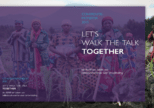 Op 23 maart 2015 presenteerde de FMS, samen met Partos en Woord en Daad, het rapport ‘Let’s Walk the Talk Together: de stand van zaken van beleidscoherentie voor ontwikkeling’. In het rapport wordt ingegaan op de huidige impact van Nederlands en Europees beleid op het gebied van belastingen, maatschappelijk verantwoord ondernemen, migratie, voedselzekerheid, vrede en veiligheid, klimaatverandering en handelsverdragen. Het laat scherp zien wat de bedoelde en onbedoelde effecten van Nederlands en EU beleid zijn voor ontwikkelingslanden, maar doet ook aanbevelingen voor de toekomst. Minister Ploumen voor Buitenlandse Handel en Ontwikkelingssamenwerking nam het rapport in ontvangst.
Op 23 maart 2015 presenteerde de FMS, samen met Partos en Woord en Daad, het rapport ‘Let’s Walk the Talk Together: de stand van zaken van beleidscoherentie voor ontwikkeling’. In het rapport wordt ingegaan op de huidige impact van Nederlands en Europees beleid op het gebied van belastingen, maatschappelijk verantwoord ondernemen, migratie, voedselzekerheid, vrede en veiligheid, klimaatverandering en handelsverdragen. Het laat scherp zien wat de bedoelde en onbedoelde effecten van Nederlands en EU beleid zijn voor ontwikkelingslanden, maar doet ook aanbevelingen voor de toekomst. Minister Ploumen voor Buitenlandse Handel en Ontwikkelingssamenwerking nam het rapport in ontvangst.
Naast FMS, Partos en Woord en Daad, droegen ook ECDPM, DIE, Tax Justice Nederland, Both ENDS, Icco, MVO Platform, Cordaid, Hivos, ActionAid en Wemos bij aan de totstandkoming van dit rapport.
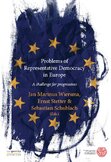 There are growing concerns about the state of representative democracy in both Eastern and Western Europe. Whether it is the rise of populism, the increase of illiberal tendencies or the expression of outright antidemocratic sentiments, the number of threats is growing. This is all the more alarming since the origins of democracy can be found in our continent. The changes have an (negative) impact on the European integration process as such and on support for EU enlargement. The articles of this book, written by young progressive academics, offer a broad perspective on democratic shortcomings and potential solutions. They make clear that although the post communist countries have followed a different trajectory, their (disillusioned) electorates have much in common.
There are growing concerns about the state of representative democracy in both Eastern and Western Europe. Whether it is the rise of populism, the increase of illiberal tendencies or the expression of outright antidemocratic sentiments, the number of threats is growing. This is all the more alarming since the origins of democracy can be found in our continent. The changes have an (negative) impact on the European integration process as such and on support for EU enlargement. The articles of this book, written by young progressive academics, offer a broad perspective on democratic shortcomings and potential solutions. They make clear that although the post communist countries have followed a different trajectory, their (disillusioned) electorates have much in common.
The publication has been edited by Jan Marinus Wiersma.
 Uit voedselgewas geproduceerde biobrandstoffen maken een belangrijk deel uit van de Europese doelstellingen op het gebied van hernieuwbare energie. Het FMS-onderzoek toont aan dat er een duidelijk verband is tussen Europees beleid enerzijds en misstanden van Europese biobrandstofbedrijven in Tanzania anderzijds.
Uit voedselgewas geproduceerde biobrandstoffen maken een belangrijk deel uit van de Europese doelstellingen op het gebied van hernieuwbare energie. Het FMS-onderzoek toont aan dat er een duidelijk verband is tussen Europees beleid enerzijds en misstanden van Europese biobrandstofbedrijven in Tanzania anderzijds.
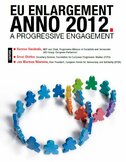 In 1993 the European Union took the decision to open its doors to the new democracies of Central, Eastern and South Eastern Europe. Eight of them joined in 2004 and two more in 2007. However, the most ambitious European project ever has yet to be concluded. This book examines the state of play anno 2012. What have we learned from earlier accessions and how does this affect the perspectives of the remaining (potential) candidate countries? What explains the much stricter conditionality of the EU and what is the role of public opinion? Why is the situation with regard to the Western Balkans and Turkey more complex? What is necessary to successfully realise the commitments made by the EU to the countries that aspire to become members? This book offers a progressive view on the enlargement process based on the conviction that without the courageous decision of the Copenhagen summit of 1993 Europe would be worse off.
In 1993 the European Union took the decision to open its doors to the new democracies of Central, Eastern and South Eastern Europe. Eight of them joined in 2004 and two more in 2007. However, the most ambitious European project ever has yet to be concluded. This book examines the state of play anno 2012. What have we learned from earlier accessions and how does this affect the perspectives of the remaining (potential) candidate countries? What explains the much stricter conditionality of the EU and what is the role of public opinion? Why is the situation with regard to the Western Balkans and Turkey more complex? What is necessary to successfully realise the commitments made by the EU to the countries that aspire to become members? This book offers a progressive view on the enlargement process based on the conviction that without the courageous decision of the Copenhagen summit of 1993 Europe would be worse off.
Edited by Jan Marinus Wiersma, Ernst Stetter and Hannes Swoboda.
 Rwanda is vooral een doorvoerland van mineralen zoals coltan vanuit buurland Democratische Republiek Congo en zelf geen grote producent hiervan. Het land is sinds de invoer van Amerikaanse wetgeving ter bestrijding van conflictmineralen bezig om mineralensmokkel aan banden te leggen. In het rapport lees je hoe de Rwandese mijnbouwsector eruit ziet, over de rol van Rwanda in mineralensmokkel vanuit Congo, en misstanden in de artisanale mijnbouw (niet-industriële mijnbouw, zoals hieronder op de foto). De rol van de Europese Unie hierbij wordt specifiek uitgelicht. Hierbij blijkt dat Europees handelsbeleid Rwandese industrialisering en waardetoevoeging ondermijnt. Rwanda en andere ontwikkelingslanden blijven fungeren als uitvoerder van ruwe grondstoffen in plaats van hier waarde aan toe te voegen, zodat dit meer economische activiteit oplevert. Veel landen in Afrika zitten vol bodemschatten maar profiteren hier nog veel te weinig van. De Europese Unie kan hier een positieve bijdrage aan leveren, maar doet dit nog te weinig.
Rwanda is vooral een doorvoerland van mineralen zoals coltan vanuit buurland Democratische Republiek Congo en zelf geen grote producent hiervan. Het land is sinds de invoer van Amerikaanse wetgeving ter bestrijding van conflictmineralen bezig om mineralensmokkel aan banden te leggen. In het rapport lees je hoe de Rwandese mijnbouwsector eruit ziet, over de rol van Rwanda in mineralensmokkel vanuit Congo, en misstanden in de artisanale mijnbouw (niet-industriële mijnbouw, zoals hieronder op de foto). De rol van de Europese Unie hierbij wordt specifiek uitgelicht. Hierbij blijkt dat Europees handelsbeleid Rwandese industrialisering en waardetoevoeging ondermijnt. Rwanda en andere ontwikkelingslanden blijven fungeren als uitvoerder van ruwe grondstoffen in plaats van hier waarde aan toe te voegen, zodat dit meer economische activiteit oplevert. Veel landen in Afrika zitten vol bodemschatten maar profiteren hier nog veel te weinig van. De Europese Unie kan hier een positieve bijdrage aan leveren, maar doet dit nog te weinig.
In 2010 and 2011 the European Forum for Democracy and Solidarity, together with other partners like the Party of European Socialists (PES) and the Progressive Alliance of Socialists and Democrats in the European Parliament (S&D Group), organized three thematic conferences in Eastern Europe, South Caucasus and Central Asia. At those conferences representatives of political parties, the civil society and the academic world discussed with European colleagues the historic development of democracy and of social democracy as well as the current situation in their respective countries. This publication presents the results, findings and conclusions of those conferences.
Edited by Marina Ohanjanyan and Jan Marinus Wiersma.
 In 2010 ging FMS-onderzoeker Sarah Hardus twee weken naar Ghana om aldaar de impact van drie Europese beleidsterreinen op het land te onderzoeken, namelijk migratie, illegale houtkap en handel (de Economic Partnership Agreements). Het volledige onderzoeksrapport ‘Ghana’s Traders, Lumberjacks and Fortune Hunters’ vind je hier.
In 2010 ging FMS-onderzoeker Sarah Hardus twee weken naar Ghana om aldaar de impact van drie Europese beleidsterreinen op het land te onderzoeken, namelijk migratie, illegale houtkap en handel (de Economic Partnership Agreements). Het volledige onderzoeksrapport ‘Ghana’s Traders, Lumberjacks and Fortune Hunters’ vind je hier.